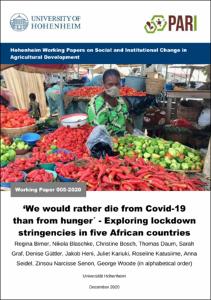‘We would rather die from Covid-19 than from hunger ́ - Exploring lockdown stringencies in five African countries

‘We would rather die from Covid-19 than from hunger ́ - Exploring lockdown stringencies in five African countries

| dc.contributor.author | Birner, Regina | |
| dc.contributor.author | Blaschke, Nikola | |
| dc.contributor.author | Bosch, Christine | |
| dc.contributor.author | Daum, Thomas | |
| dc.contributor.author | Graf, Sarah | |
| dc.contributor.author | Güttler, Denise | |
| dc.contributor.author | Heni, Jakob | |
| dc.contributor.author | Kariuki, Juliet | |
| dc.contributor.author | Katusiime, Roseline | |
| dc.contributor.author | Seidel, Anna | |
| dc.contributor.author | Senon, Zinsou Narcisse | |
| dc.contributor.author | Woode, George | |
| dc.date.accessioned | 2023-05-09T09:20:29Z | |
| dc.date.available | 2023-05-09T09:20:29Z | |
| dc.date.issued | 12.2020 | |
| dc.identifier.uri | https://hdl.handle.net/20.500.11811/10825 | |
| dc.description.abstract | Facing the first wave of COVID-19, African countries were confronted with a dilemma: enacting strict lockdowns in order to “flatten the curve” could lead to a potentially severe drop in food security. Given this catch-22 situation, there was widespread concern that Africa would suffer most from the pandemic. Yet, emerging evidence shows that COVID-19 deaths in Africa have remained low, while “biblical famines” have been avoided, so far. This paper explores how five African countries maneuvered around the potentially large tradeoffs between public health and food security when designing their policy responses to the first wave of COVID-19 based on a content analysis of 1,188 newspaper articles. The findings show that the countries did not merely mimic the lockdown response of high-income countries – as the theory of policy diffusion would suggest. Acting under high uncertainty and urgency, the five countries adopted lockdown strategies that were “feasible” for them, reflecting both their food security situation and degree of political freedom. This confirms Amartya Sen’s theory of famines which predicts that democratic discourse can avert the worst food security outcomes. The paper provides insights into theories explaining government choices, including theories that focus on policy processes, public choice and policymaking in crisis. Understanding how African countries have navigated through the dilemma between pandemics and famines is of high significance since the food security effects that occur in the context of the ongoing pandemic – and potential future pandemics – are largely shaped by policy responses of governments. | en |
| dc.format.extent | 32 | |
| dc.language.iso | eng | |
| dc.relation.ispartofseries | Hohenheim Working Papers on Social and Institutional Change in Agricultural Development ; 005-2020 | |
| dc.rights | In Copyright | |
| dc.rights.uri | http://rightsstatements.org/vocab/InC/1.0/ | |
| dc.subject | Covid-19 | |
| dc.subject | Food and nutrition security | |
| dc.subject | Africa | |
| dc.subject.ddc | 330 Wirtschaft | |
| dc.subject.ddc | 360 Soziale Probleme, Sozialdienste, Versicherungen | |
| dc.title | ‘We would rather die from Covid-19 than from hunger ́ - Exploring lockdown stringencies in five African countries | |
| dc.type | Arbeitspapier | |
| dc.publisher.name | University of Hohenheim | |
| dc.publisher.location | Hohenheim | |
| dc.rights.accessRights | openAccess | |
| dc.relation.doi | https://doi.org/10.1016/j.gfs.2021.100571 | |
| dc.relation.url | https://490c.uni-hohenheim.de/en/75736 | |
| ulbbn.pubtype | Zweitveröffentlichung |




